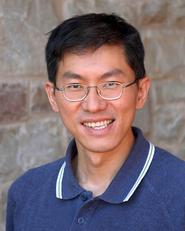
“The evolutionary history of histone H3 suggests a deep eukaryotic root of chromatin modifying mechanisms,” a paper co-authored by Assistant Professor of Biology Wei-Jen Chang, was published in the online journal BMC Evolutionary Biology. In the paper, Chang and collaborators Jan Postberg, Sakeh Forcob and Hans J. Lipps from the University of Witten/Herdecke in Witten, Germany, present the results of their research into the evolution of histone proteins in eukaryotes.
Eukaryotic DNA is wrapped with histone proteins. Modifications on these proteins, which will then affect how tightly histones bind to DNA, could change gene expression levels and subsequently alter phenotypes without changing genotypes – a mechanism commonly known as epigenetic effect. Using phylogenetic analyses, the researchers determined that the last common eukaryotic ancestor could have already had the capability to alter gene expressions through histone modifications. The researchers say this characteristic might have played an important role in early eukaryotic diversification.
Posted May 25, 2011
